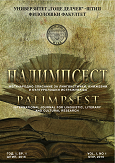VIRTUAL REALITY AND READING CITIES: GPS-BASED APPLICATIONS AS A NEW FORM OF LITERARY TOURISM
VIRTUAL REALITY AND READING CITIES: GPS-BASED APPLICATIONS AS A NEW FORM OF LITERARY TOURISM
Author(s): Ana StefanovskaSubject(s): Language and Literature Studies, Tourism
Published by: Универзитет »Гоце Делчев« - Штип
Keywords: Virtual Reality; Literary and Cultural Tourism; Spatial Studies; Geocriticism.
Summary/Abstract: Drawing upon Westphal’s idea of the city conceived as a “mega-Book”, recent studies in the field of Digital Humanities have shown an interest in translating real itineraries into fictional ones, as well as in introducing imaginary spaces and characters to our geospace. Since this interrelation between the real and fictional has become a blurred one, new layers of meaning have been attributed to the geographical places and their potential economic benefit when used in relation to tourist attractions. The process of this hyper-realization, a technologically and culturally mediated experience that takes reality to its limits, is nowadays impacting the most actual practices of cultural tourism in Italy and beyond. Introduced by the intersection between fiction and reality and put into practice by means of geospatial technologies, the use of advanced “interactive maps” and GPS-based applications as means of orientation is constantly changing the concept of literary pilgrimages and “jet-setting” tourism. The aim of this presentation is to reflect on the intersection between actual concepts such as “reading spaces” as defined by Westphal and Baudillard’s “hyper-reality” that do not only endow the idea of traveling with a different, modified character, but also tend to merge real spaces, fictional places and virtual maps, and, thus, modify the concept of “reality” itself.
Journal: Палимпсест, Меѓународно списание за лингвистички, книжевни и културолошки истражувања
- Issue Year: 5/2020
- Issue No: 09
- Page Range: 193-200
- Page Count: 8
- Language: English

